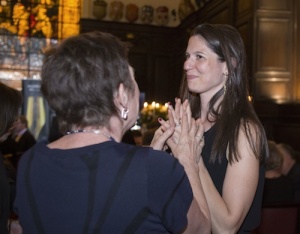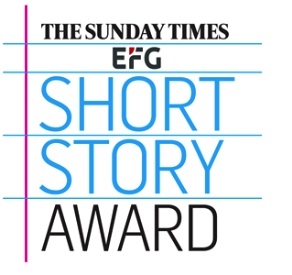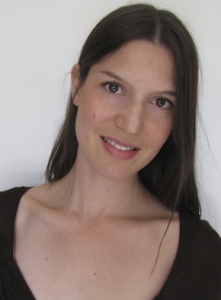Courtney Zoffness: Connections and capabilities
by Mark Reynolds
Courtney Zoffness is announced at the winner of the 2018 Sunday Times EFG Short Story Award © Tom Pilston
Courtney Zoffness has won the 2018 Sunday Times EFG Short Story Award for her provocative but delicately told ‘Peanuts Aren’t Nuts’, which explores a troubling relationship between an impressionable young student called Pam and her creepy biology tutor Mr Peebles. She triumphed over a strong shortlist of all-American writers also featuring Allegra Goodman, Miranda July, Victor Lodato, Molly McCloskey and Curtis Sittenfeld, to claim the £30,000 prize – the richest in short fiction. I caught up with Courtney at the awards dinner at London’s Stationers’ Hall, just minutes after the announcement of her win, to chat about sexual predation, writing contests, the creative process and her ongoing projects.
MR: So how does it feel?
CZ: Fantastic, and shocking still, but wonderful.
And how do think you might spend the prize money?
No plans yet, because I was not expecting to win. But the truth is that it will go toward childcare, so that I can write some more.
How did you react to being selected among the longlisted, then shortlisted entries? And has the process brought you closer to the other writers and their work?
It felt amazing and surprising at every stage. To be longlisted was a surprise, to be further shortlisted was a shock. It has brought me closer to the other writers’ work; unfortunately not so much to the writers as yet, most of whom I only met tonight for the first time and have not really had a chance to chat with, but I hope to do so later.
I set out to explore how imbalanced power dynamics combined with adolescence can be incredibly confusing and misguiding. But I am also interested in how all humans can be at once prey and predator.”
The story also won the 2016 American Literary Review Fiction Contest, and was subsequently published last spring in the ALR. Is that what gave you the confidence to submit the same story for this prize?
Yes, winning definitely helped with the confidence. And also – if one can have favourites among their children – I was fond of this story and had begun the process of expanding it into a novel, because I had imagined a whole world around it.
How far along are you?
I’m a little superstitious about talking about how far along. I’m almost not that sure, because I’m not writing it in order. But I’m making my way, and I can see a clear shape for it. I’m also at work on another book; I’m finishing a memoir in essays. While fiction was my priority, I was doing these essays on the side, sort of procrastinatorially, if that’s a word.
Let’s say it is…
OK, we can use it… And then when I gathered them up I realised that there was a clear through-line, and I had a few more that I wanted to write, and realised how easily they would complete an arc of sorts. So that will finish first because it’s almost done.
Is that connected to the Arts & Letters Creative Nonfiction Prize you received for ‘It May All End in Aleppo’.
It is, that’s one of the essays that will be in the book.
Could you say a little about that piece?
Sure. One of my first jobs out of graduate school for creative writing was as a ghostwriter, and I ghostwrote a memoir for a 55-year-old Syrian-Jewish man who had escaped from Aleppo in the 1960s with help from the Israeli Navy. So I wrote his story, and in order to write it spent a lot of time interviewing him, reading books about Syria and its history, and I wound up buried under stacks of books trying to understand the political history, the religious history, the archaeological history, all the ways in which this place shaped the man whose story I was trying to tell. The first half of the book took place in Aleppo, and the second half was his escape to Israel and then the States. And when civil war started in Aleppo and Aleppo became heavily featured on the news, I felt this bizarre personal connection to a place that I’d never visited. So I wrote an essay about what it’s like to inhabit someone else’s story, and how that creates connection and empathy.
 Sounds great. Now back to this story, there’s no question that Mr Peebles is guilty of grooming and molesting students…
Sounds great. Now back to this story, there’s no question that Mr Peebles is guilty of grooming and molesting students…
That’s true.
… and the signs are also there for Pam.
Potentially.
And yet there’s part of her that is attracted to him. And then Pam also displays a predatory impulse, albeit for confused motives. Did you set out to explore how sometimes a person’s sexuality can override other instincts and reason?
No, I set out to explore how imbalanced power dynamics combined with adolescence can be incredibly confusing and misguiding. But I am also interested in how we, all humans – although of course Mr Peebles in an extreme example of this – how all humans can be at once prey and predator, depending on context. I think we all have those capabilities.
Pam is caught in multiple grey areas, between adolescence and adulthood, between innocence and guilt, fear and longing, certainty and doubt. Do you think the #MeToo campaign is too black-and-white, and too quick to call out who’s an offender and who’s a victim?
No, I don’t think it’s too quick to call out anything. I think it’s a really important movement in that it’s imbuing victims with a confidence they didn’t have before to express what ailed them in their pasts, and even in their present. But I do also think there are various shades of grey, which is one of the aims of my story, to explore the ways in which technically not illegal behaviour can be deeply confusing for someone on the receiving end, and I think that’s something that maybe this movement will – it hasn’t yet – but will make clear that there are steps before those illicit, illegal and reprehensible acts that are also confusing and awful.
On the wider stage, if Trump can survive Pussygate on the campaign trail, do you think Stormy Daniels can bring him down as President?
I certainly hope so. I’m no political expert, but I don’t think if he goes down it will be because of her, but I am certainly grateful to have her voice in the mix.
It seemed the story is not set in a specific place. Are you finding as you’re working it into a novel that you need to fix it more geographically?
I called it Hillside, bit I didn’t tag any state. I imagined it in a northeastern suburb, not too unlike the one in which I grew up, but I hadn’t geographically bordered the setting.
And you’re not feeling the need to locate it more specifically?
No. I may, but I haven’t yet.
Which short story collections have you recently read and enjoyed, and which classic collections do you particularly recommend?
A book that I named when I was interviewed earlier, which is not technically a short story collection, is We the Animals by Justin Torres. It’s a very slim novel, but pieces of it were published independently and I think of it as a collection of stories. It’s a lyrical wonder, and that’s one of my favourite books. I very much like the short stories of Alice Munro and Lorrie Moore. And I just read Elizabeth Strout’s Olive Kitteridge for the first time. Her prose is much quieter than the kind of writing I typically like, but I found the book to be incredibly immersive.
You run the Creative Writing Program at Drew University. What are the first rules you instil in your students about approaching a short story?
Hmm, I don’t know if I have first rules, but I break my classes up according to craft techniques, so we’ll try to isolate one technique per week. Say my class meets once a week, for one workshop we’ll focus on, say, dialogue, and look at dialogue-heavy stories and to see how the dialogue is moving the story forward or deepening our understanding of character; and the next week we’ll look at characterisation, and stories that do a wonderful job of deepening that understanding in a multi-dimensional way. So we do technique by technique, and then these techniques obviously have to coalesce to make a complete story, which is their challenge and their requirement.
Is creative non-fiction part of that course as well?
I teach fiction and creative non-fiction. They’re separate classes, but I teach creative non-fiction in very much the same way, because the practice of creative non-fiction is applying fictional techniques to telling true stories.
You’ve said that for you language can be more important than plot…
Sometimes I think it can be. We the Animals is a good example of a book which by the end has a plot, but I think it’s the lyricism of the prose that sustains it, and that’s a quality I highly admire in literature.
You’ve just recorded a reading of the story. Is that something you’re comfortable with?
Reading it aloud wasn’t awkward at all, because I should say that I write aloud. I care a lot about rhythm of language, and when I’m testing out sentences and scenes I read them to myself. To my poor husband and children I sound like a crazy person wandering around the house, but it’s natural for me to read it, because I know exactly how the lines should sound.
Read the winning story, ‘Peanuts Aren’t Nuts’
 Courtney Zoffness won the 2017 Arts & Letters Creative Nonfiction Prize, the 2016 American Literary Review Fiction Prize, and was an Emerging Writing Fellow at the Center for Fiction. She has received awards from the MacDowell Colony and the Bread of Loaf Writers’ Conference. Her work has appeared or is forthcoming in publications including The Southern Review, Indiana Review and the Los Angeles Review of Books. She has taught at numerous institutions, including Yale University, the University of Pennsylvania, Allegheny College and the University of Freiburg, where she was a writer-in-residence. She currently directs the Creative Writing Program at Drew University in New Jersey and lives with her family in Brooklyn.
Courtney Zoffness won the 2017 Arts & Letters Creative Nonfiction Prize, the 2016 American Literary Review Fiction Prize, and was an Emerging Writing Fellow at the Center for Fiction. She has received awards from the MacDowell Colony and the Bread of Loaf Writers’ Conference. Her work has appeared or is forthcoming in publications including The Southern Review, Indiana Review and the Los Angeles Review of Books. She has taught at numerous institutions, including Yale University, the University of Pennsylvania, Allegheny College and the University of Freiburg, where she was a writer-in-residence. She currently directs the Creative Writing Program at Drew University in New Jersey and lives with her family in Brooklyn.
courtneyzoffness.com
shortstoryaward.co.uk
@ShortStoryAward
Mark Reynolds is a freelance editor and writer, and a founding editor of Bookanista.
@bookanista

